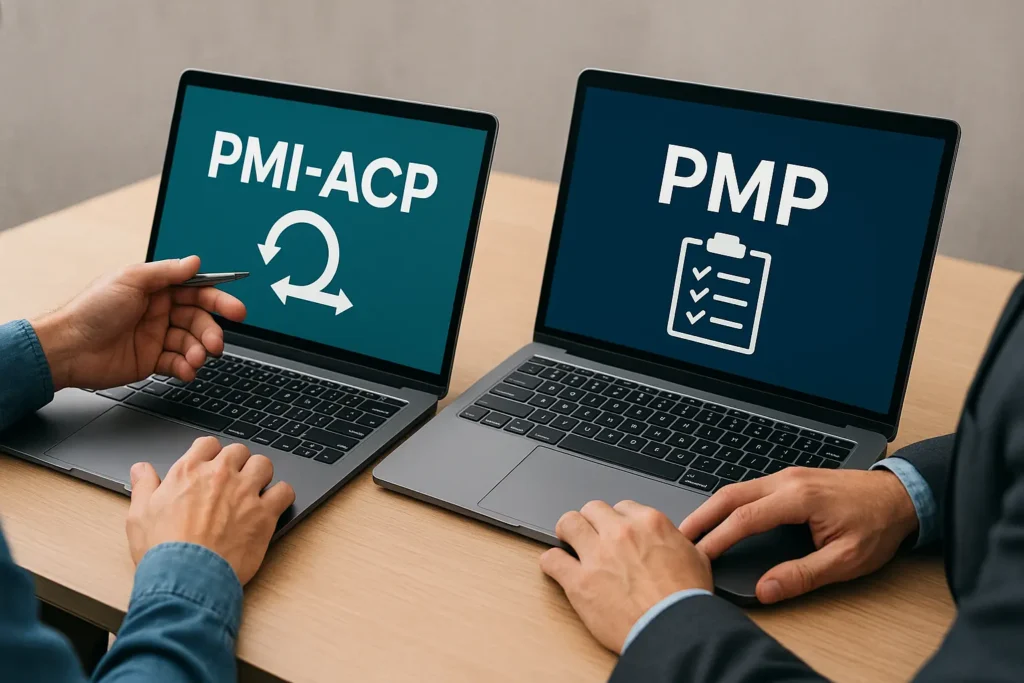How to Leverage PMI-ACP® without Forgetting the Basics: PMI-ACP® vs PMP®
By: Hajime Estanislao, PMP®; Editor: Geram Lompon; Reviewed by: Alvin Villanueva, PMP®, PMI-ACP®
You have either earned your PMP® or are seriously considering it, which means you already know how to manage a structured project: plan thoroughly, organize the team, and track progress with precision.
But what happens when customer feedback arrives mid-execution? When do priorities shift between planning and delivery? Or when your team expects flexibility instead of a fixed direction?
Relying solely on traditional
It is where Agile comes into play, not as a trend, but as the new standard for handling complexity. In environments that demand frequent updates, short feedback loops, and rapid decision-making, the PMI Agile Certified Practitioner (PMI-ACP®) certification proves essential.
In the comparison of PMP® vs PMI-ACP®, think of PMP as your anchor in structure and PMI-ACP as your compass for change. Together, they prepare you for a broader range of challenges, particularly those found in agile
Now, picture leading initiatives where planning is iterative, progress is reviewed, and your team thrives on customer feedback and progressive documentation. The PMI-ACP® bridges your core
If your goal is to grow, not just maintain your relevance as a project professional, now is the time to expand your toolkit. The PMI-ACP® doesn’t revoke your PMP® credentials; it builds upon them. At ROSEMET LLC, we support project managers making this shift with resources built for agility, backed by practical experience. Ready to lead projects where both stability and adaptability matter? Let’s start there.
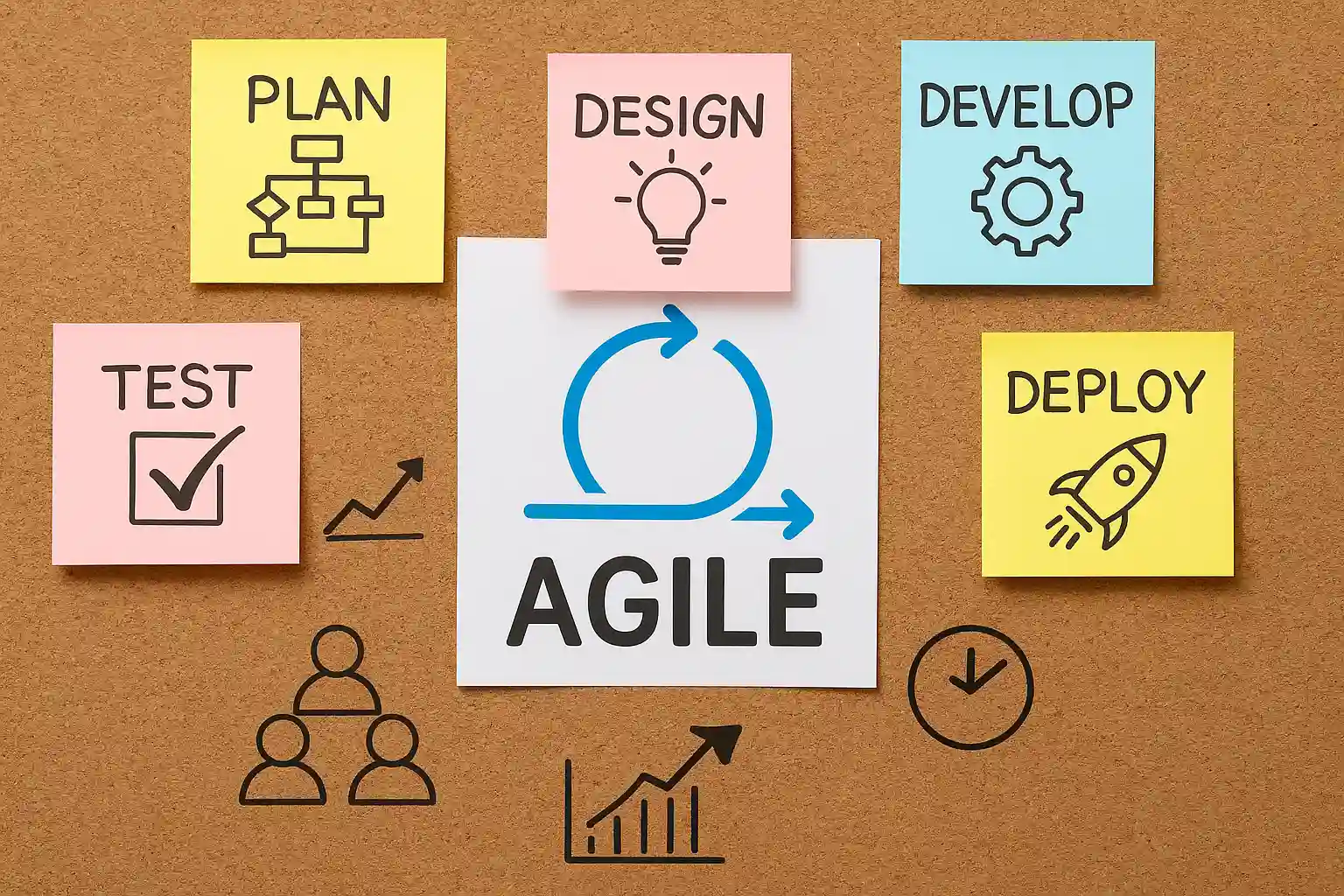
What is PMI-ACP?
The PMI Agile Certified Practitioner (PMI-ACP) is a professional credential from the Project Management Institute (PMI) that acknowledges hands-on experience and applied knowledge in Agile
Unlike certifications that limit focus to a single methodology, the PMI-ACP integrates a range of Agile frameworks, such as Scrum, Kanban, Lean, and Extreme Programming (XP), among others. This provides a flexible foundation for professionals who navigate both agile and traditional
Tailored for practitioners actively engaged in Agile environments, this certification validates your ability to lead teams through adaptive planning, foster continuous improvement, and respond to change with confidence. The PMI-ACP places strong emphasis on applied skill—aligning theory with practice in fast-paced environments, dynamic industries, and complex projects with evolving stakeholder expectations.
Whether overseeing Agile teams, collaborating across disciplines, or managing hybrid delivery models, the PMI-ACP supports your transition beyond conventional approaches. It is a credential that not only reflects your
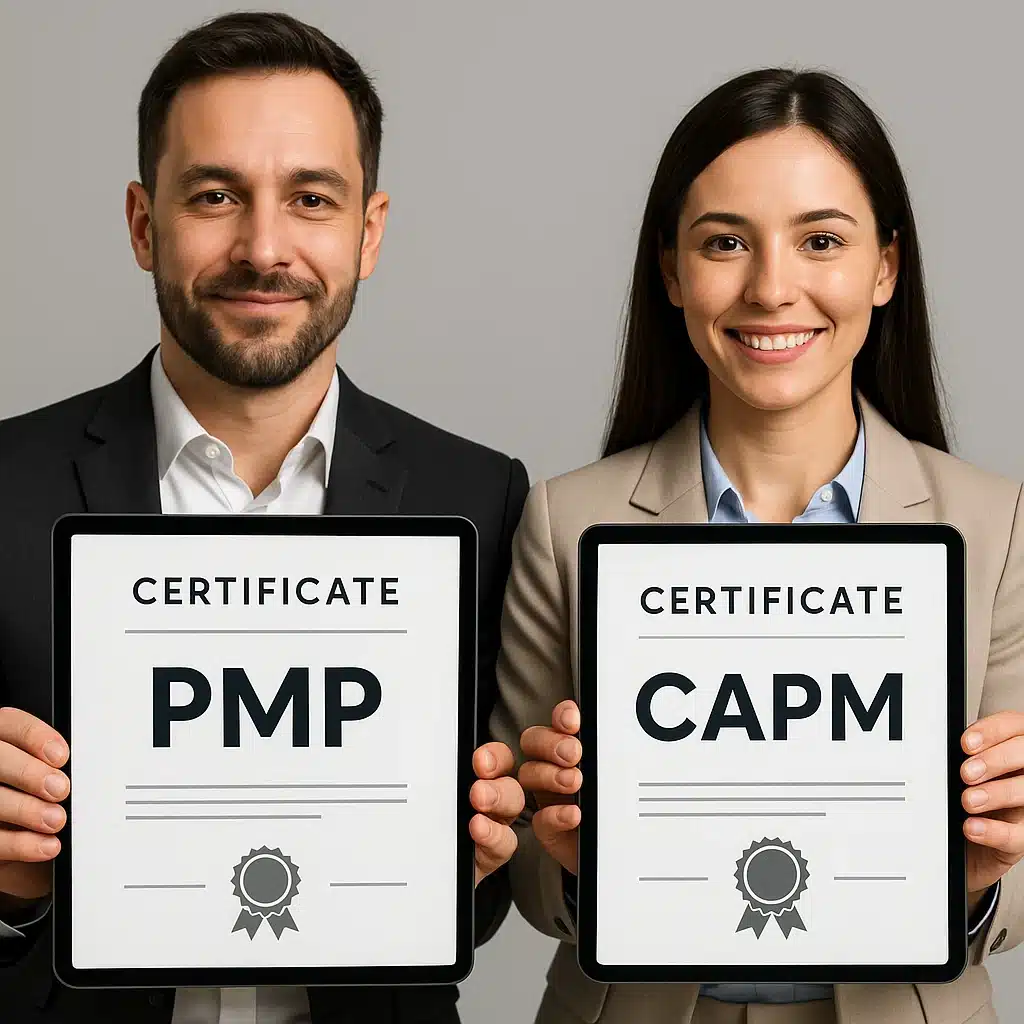
What about PMP and CAPM?
The
The PMP certification is for experienced professionals who manage complex projects and lead cross-functional teams. It emphasizes a blend of traditional
- A four-year degree
- 36 months of
project management experience - 35 hours of formal
project management training (or a valid CAPM certification)
Alternatively, professionals with a high school diploma or an associate’s degree must demonstrate 60 months of experience in
The CAPM certification is suitable for individuals new to the field, including students, recent graduates, or professionals assigned to project work. It builds familiarity with key terms, processes, and the PMBOK Guide, establishing a strong knowledge base for working within a project team. CAPM candidates need only:
- A high school diploma (or global equivalent)
- 23 hours of formal
project management education
While PMP certifies your ability to lead and deliver across project types, CAPM introduces you to the frameworks, language, and structure of the profession. Both are stepping stones, but each supports different moments in your development process.
Reasons You Need to Consider PMI-ACP even if you already hold the PMP
Even with a PMP and a proven track record in delivering structured projects, many project managers are finding that the rules have shifted. Modern work environments rarely follow a straight path as requirements evolve, priorities shift, and speed is a key factor.
In this reality, traditional
Where PMP helps you define and control, PMI-ACP prepares you to pivot and adjust. It allows you to move confidently between predictive and agile approaches, meeting stakeholders where they are, whether that’s a tightly scoped rollout or an iterative innovation cycle.
- Demonstrates versatility – Validates your ability to manage both waterfall projects and agile projects, making you adaptable in mixed-method settings.
- Expands career opportunities – Opens doors to roles like Agile Coach, Scrum Master, and Product Owner in agile
project management landscapes. - Responds to industry shifts – Aligns your skill set with organizations shifting toward agile methodologies and hybrid
project management models. - Strengthens stakeholder collaboration – Highlights your use of iterative delivery, continuous feedback, and stakeholder engagement as part of regular project rhythms.
- Improves delivery under uncertainty – Equips you to navigate changing priorities without losing momentum or clarity.
- Supports innovation-focused projects – Especially suited for software development or evolving product teams where scope is fluid and releases are frequent.
- Boosts team leadership – Reinforces your role as a facilitator and servant leader, helping teams stay motivated, aligned, and accountable.
- Complements PMP – Rather than duplicating what you know, it applies agile principles to real-world delivery challenges, expanding your toolkit with practical, flexible solutions.
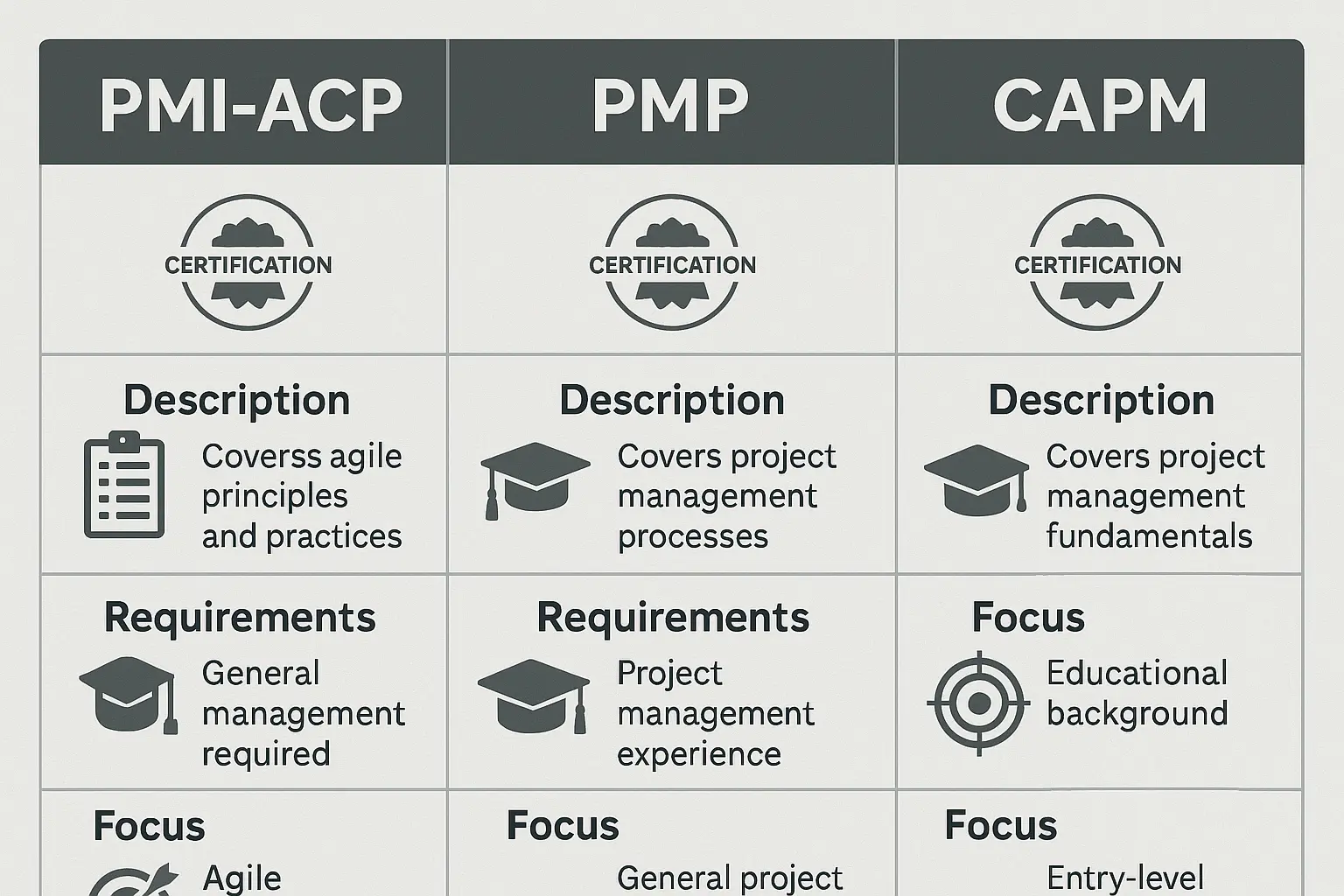
Comparing PMI-ACP Certification, PMP, and CAPM – A Practical Guide
Understanding the distinctions between PMI-ACP, PMP, and CAPM can help you identify which certification best supports your current career stage, the types of projects you manage, and the
Each credential emphasizes a different set of skills and frameworks, ranging from traditional
PMI-ACP (Agile Certified Practitioner)
The PMI-ACP is suited for professionals who regularly apply agile practices. It’s designed for those involved in agile
This certification demonstrates your understanding of various agile frameworks, including Scrum, Kanban, XP, and Lean. It also reflects a project manager’s ability to lead in dynamic environments and empower agile teams.
Requirements:
- Secondary degree (e.g., high school diploma or global equivalent)
- 2,000 hours of general
project management experience (within the past 5 years) - 1,500 hours on agile project teams (within the past 3 years)
- 21 contact hours of agile training
Outcomes:
- Demonstrated ability to support agile teams and lead adaptive projects
- Competence in applying continuous feedback, rapid decision-making, and iterative planning
- Qualifications for roles such as Agile Project Manager, Scrum Master, or Agile Coach
- Credibility in managing complex projects that require flexibility, collaboration, and fast turnaround
PMP (Project Management Professional)
The
It is well-suited for those managing complex projects that demand detailed planning, coordinated execution, and risk-focused decision-making.
Unlike entry-level certifications, the PMP is designed for individuals who have already demonstrated strategic leadership, operational oversight, and the ability to align project outcomes with organizational goals.
Whether overseeing the entire project lifecycle or adapting delivery strategies across predictable and iterative processes, the PMP reinforces your ability to lead with precision.
Requirements
- A four-year degree and 36 months of
project management experience, or - A secondary degree (e.g., high school diploma) and 60 months of project experience
- 35 contact hours of formal
project management training or an active CAPM® certification
Outcomes
- Demonstrated mastery of initiating, planning, executing, monitoring, and closing projects
- High-level competence in risk management, stakeholder engagement, and detailed planning
- Proven ability to manage using both traditional methodologies and agile
project management approaches. - Recognition for strategic thinking and project leadership in fields like construction, IT, finance, and engineering
- Eligibility for advanced roles such as Program Manager, PMO Director, or Portfolio Manager
- As industries evolve to strike a balance between structure and flexibility, the PMP provides a strong foundation for meeting predictable outcomes and changing demands, especially when paired with additional agile-focused credentials, such as the PMI-ACP.
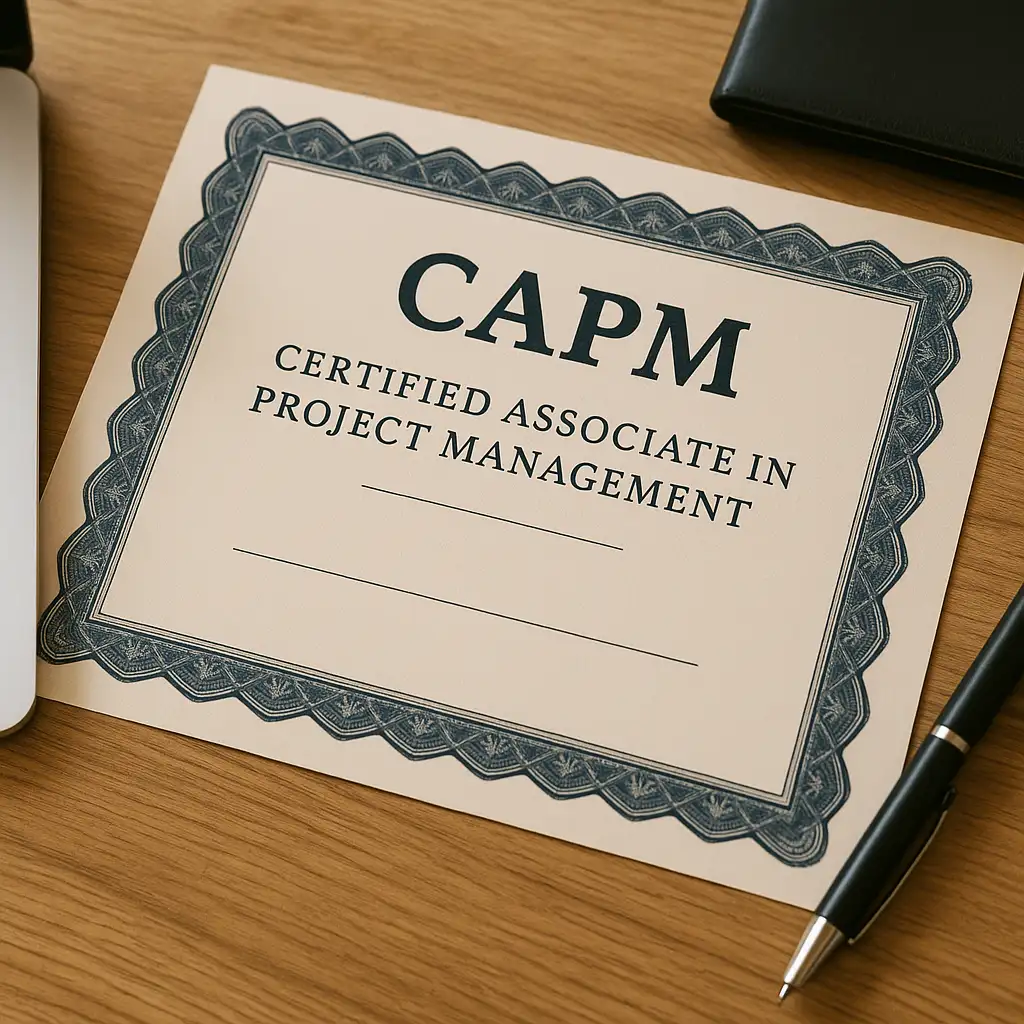
CAPM (Certified Associate in Project Management )
The Certified Associate in
Offered by the Project Management Institute (PMI), the CAPM provides a structured introduction to the core concepts, terms, and processes outlined in the PMBOK Guide.
Unlike the PMP or PMI-ACP, CAPM does not require prior project leadership experience, making it accessible to early-career professionals or team members looking to deepen their understanding of how projects operate.
CAPM certification focuses on traditional
Requirements
- A secondary degree (high school diploma or global equivalent)
- 23 hours of formal
project management education (completed before the exam)
Outcomes
- A grasp of
project management fundamentals, roles, and terminology - Preparation for contributing to traditional or hybrid project teams
- An excellent foundation for progressing to more advanced certifications like the PMP or PMI-ACP
- Recognition of your commitment to a
project management career, even at the entry level
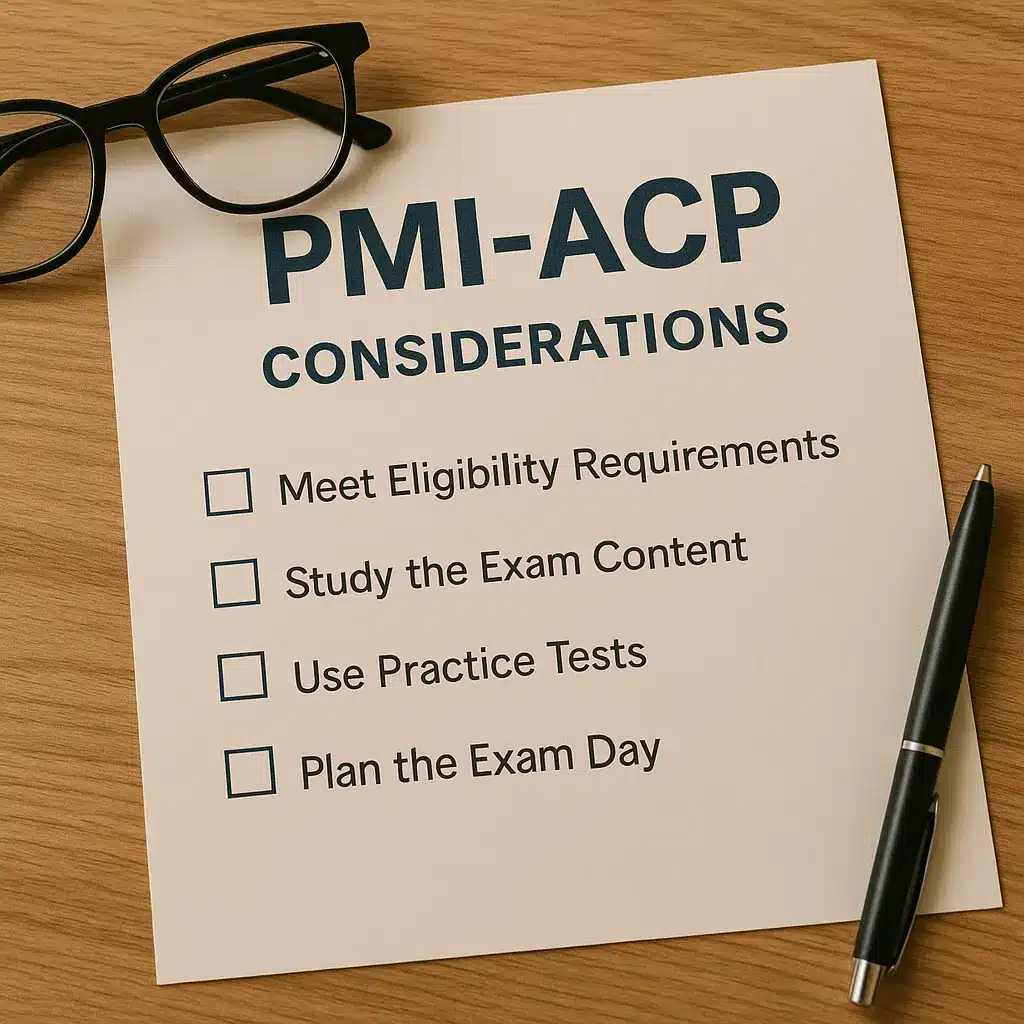
Considerations For Successfully Passing the PMI-ACP
Passing the PMI-ACP exam requires more than time spent studying; it calls for a mindset shift. It is not an exam built around definitions and diagrams; it is about demonstrating your ability to think and act like an Agile practitioner.
It will test your ability to apply Agile principles, such as iterative planning, adaptive decision-making, and continuous feedback, within the complexity of real-world project settings.
If your background is grounded in traditional
One area candidates often overlook is the exam format. The PMI-ACP exam is composed primarily of scenario-based questions, each requiring you to assess context, apply agile practices, and choose the most aligned action. It means success is knowing the content and how to use it in motion.
Include timed practice exams in your prep routine, and review which of the four domains: Mindset, Leadership, Product, and Delivery, you are most likely to struggle with. Then, deepen your learning with focused review or even peer discussion to bridge those gaps.
Agile thrives on human interaction, so should your exam prep. Whether joining online study groups, attending local Agile meetups, or sharing challenges with a colleague, these exchanges expose you to new industries, interpretations, and project scenarios.
Listening to how others solve problems using Agile frameworks will build your ability to respond with agility, and not just recite terms. The PMI-ACP certification will recognize your ability to grow, respond, and deliver value, regardless of project complexity.
Wrapping Up: Set up for Success with ROSEMET
Choosing between the PMI-ACP, PMP, and CAPM depends on your current role, your experience level, and your career goals in
At ROSEMET, we help project professionals gain traction, whether they are starting with the basics, expanding beyond traditional
You don’t just need another course, you need a way forward. ROSEMET provides structure where needed, space to adapt when necessary, and support that evolves with your goals. Whether you’re just starting in your
References
Project Management Institute. (2021). A Guide to the
Project Management Institute & Agile Alliance. (2021). Agile Practice Guide . Project Management Institute.
Project Management Institute. (2024). PMI-ACP® Exam Content Outline. Retrieved from https://www.pmi.org/-/media/pmi/documents/public/pdf/certifications/pmi-acp-exam-content-outline.pdf
Project Management Institute. (2024). PMI-ACP® Handbook. Retrieved from https://www.pmi.org/-/media/pmi/documents/public/pdf/certifications/pmi-acp-handbook.pdf
Project Management Institute. (2024). PMI Agile Certified Practitioner (PMI-ACP®). Retrieved from https://www.pmi.org/certifications/agile-acp
Project Management Institute. (2024). PMP® Certification. Retrieved from https://www.pmi.org/certifications/project-management-pmp
Project Management Institute. (2024). Certified Associate in
